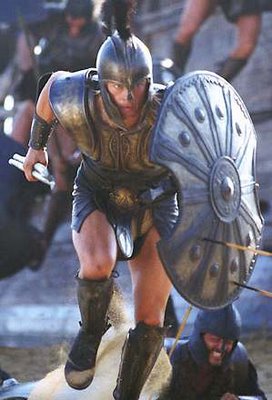classical lit
Friday, February 02, 2007
Wednesday, January 31, 2007
week 3
Monday, January 29
Epiphany: To show forth something higher, comes from the Greek word 'phanos'
theophany: the showing forth of the divine
eureka: a greek word, meaning 'to find'
mnemosyne: the mother of the muse's, meaning 'memory,' who 'consorted' with Zeus to create them
Nabokov: a brilliant Russan author who wrote 'Speak Memory' and 'Lolita'
Epic=long and pointed. ex) Homer's 'Oddity' (Odyssey), and 'Idiot' (Iliad), Virgil's 'Aeneid'
Drama= usually a tragity, short and focused. ex) Plato's 'Antigone,' and Critias' 'Euripides'
4 Canonical dramatists:
1) Sophocles
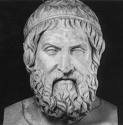 2) Euripides
2) Euripides  3) Aristophanes
3) Aristophanes 
4) Aeschylus
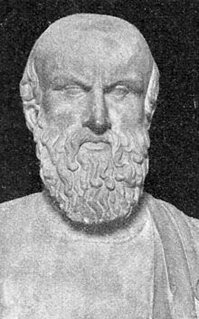
These four men define classical literature!
A few other types of literature are:
- Lyric Poetry: like Pendar
- Hymns: Like the Homeric Hymns
- Theogony: 'written' by Hesiod, and leads to the emergance of Zeus, and the birth of the gods. Root word= 'Gon' which means birth
A few name meanings:
- Theodore: 'theo' means God + 'dore' means gift= God's gift
- Michael: 'One who is like God'
- Antigone: 'anti' means against + 'gone' means birth (womb)= against birth
- Brittini: means 'strong and industrious'
Demeter is a 'root metaphor' for many things, some of which are:
- the beginning of love
- the beginning of marriage
- of biology: in the beginning there were mothers and daughters, and then men came and messed everything up!
Saturn Devouring his Children:
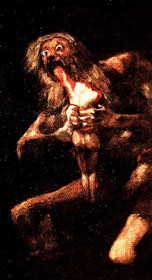
pretty disgusting if you ask me!
"Men are like microwave ovens. Useful, but not necessary!"
Rapunzel (this is the Grimm's version discussed in class)
Cereal: comes from the roman goddess Ceres (goddess of the grain)
etiology: Explaination of why we have something ex) the story of Demeter is why we have seasons
narcissus: 'the act of looking' "As Pausanias also notes, yet another tale is that the narcissus flower was created to entice Demeter's daughter Perciphane away from her companions to enable Hades to abduct her." ~Wiki.com
week 2 (part 3)
Friday January 26
The Trojan Women

politics: polise- the city 'polis' also meaning the city vs the individual
BCE= Before common era

chthonic: 'thonic' of or related to the underworld, which was created by men
Steiner page 120:
"It has been proposed that Sophoclean treatment of the relations between the living ___ and the claims of the dead, particularly in Antigone, reflects the atmosphere and style of Athenian politics as declared in Pericles' celebrated funeral oration which was delivered in the winter of 431-30 BC. Some scholars find evidence for a new spate of familial tombs in Athens at about this time. Ajax and Antigone would constitute a pointed advocacy for the freedom of familial burial practices at a moment when the state, under pressure of war and internal polemic, was seeking to control, indeed to regiment, private piety."
Here is the wiki site for the Homeric Hymns, its got some really interesting info!
Here the lyrics that I couldn't remember in class, I also included a few other great songs that my sister and I would blare to annoy my parents when we were young:
John Lennon 'Jealous Guy' lyrics
Michael Jackson's 'Black or White' lyrics
Meatloaf's 'I would do anything for love (But I won't do that)' lyrics
George Thorogood and the Destroyers 'One Bourbon, One Scotch, and One Beer' lyrics
SING!!! "I'm gonna sing this song..."
To write well back in the day you had to first invoke the muses:
- Calliope, Muse of epic song
- Clio, Muse of history
- Euterpe, Muse of lyric song
- Thalia, Muse of comedy and bucolic poetry
- Melpomene, Muse of tragedy
- Terpsichore, Muse of dance
- Erato, Muse of erotic poetry
- Polyhymnia, Muse of sacred song
- Urania, Muse of astronomy
Many things have the route word 'muse':
- museum
- musical
- amused
The writers of the time didn't believe that they were actually creating anything, they believed that they were the vessels that the muses' were working through
Homer Simpson, freak or genius? Who knows?
polytropos: poly = many, trope= a word used in a figurative sense, image "to turn"
concubine: what my mom would call "a lady of the night"
Gesand ist dasein: song is existence
Wally Stevens once said: "I have no life out of poetry"
anamnesis: recollection "you know everything, you have just forgotten it"
STORY TIME!!!!
Once upon a time you lost your wings, but every time you encounter something beautiful in this world your shoulders start to itch.
~Plato
- Mother and daughter
- Madonna and Bambino
- Demeter (the mother of corn) and Persephone (the virgin)
- the old woman and the young girl
this story is all about being abducted or raped
week 2 cont.
Wednesday January 24
chorus sings: I thought this was really funny, and interesting! You can find it on wiki using the link from 'chorus sings' "Use of the chorus can be seen not
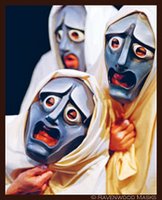 only in ancient Greek tragedies, but also in more recent works such as Shakespeare's 'Romeo and Juliet,' the musical/film 'Little Shop of Horrors,' the Farrelly brothers' film 'There's Something About Mary', Leonard Bernstein's one-act opera 'Trouble in Tahiti,' and the Woody Allen film 'Mighty Aphrodite'."
only in ancient Greek tragedies, but also in more recent works such as Shakespeare's 'Romeo and Juliet,' the musical/film 'Little Shop of Horrors,' the Farrelly brothers' film 'There's Something About Mary', Leonard Bernstein's one-act opera 'Trouble in Tahiti,' and the Woody Allen film 'Mighty Aphrodite'."
Captain Picard!!

dialectic: a conversation between peers
"If you can't believe Captain Picard, who the hell can you believe?" ~Dr. Sexson
The Epic of Gilgamesh: an epic poem from Babylonia and is among the earliest known literary works. A series of Sumerian legends and poems about the mythological hero-king Gilgamesh, thought to be a ruler of the 3rd millennium BC, were gathered into a longer Akkadian poem long afterward, with the most complete version extant today preserved on twelve clay tablets in the library collection of the 7th century BC Assyrian king Assurbanipal.
One of the stories included in the epic relates to the deluge. The essential story revolves around the relationship between Gilgamesh, a king who has become distracted and disheartened by his rule, and a friend, Enkidu, who is half-wild and who undertakes dangerous quests with Gilgamesh. Much of the epic focuses on Gilgamesh's feelings of loss following Enkidu's death, and is often credited by historians as being one of the first literary works with high emphasis on immortality. (all in read from wiki)
- The stories about today are empty unless they are energized by the past
- Everything you read has behind it another story
The notorious William Randolph Hearst is back again! He, and his crazy granddaughter Patty are still making headlines years later! All thanks to Citizen Kane, and her interesting love affair...
Sunday, January 28, 2007
Oh Hermes...
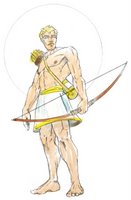
 I think that this is one of the funniest things I have ever read! To try and imagine Apollo yelling at a baby, who is talking back to him, is absolutely hilarious!! This reminds me of another baby, Stewie from 'Family Guy.' He is constantly trying to take over the world, and yet no one suspects him, because he is just a little, helpless baby. It is quite entertaining, if you ask me! Apollo, however is a grown 'man' and yet, Hermes gets the better of him. It reminds me of when I was three, and how my older brother (who was 13) would argue with me for hours! My Mom would try to tell him that I was too young to understand reason, but never-the-less he would do it anyway. The only difference between that situation and the Hermes' situation is that obviously Hermes understood and was aware of what he was doing to his brother.
I think that this is one of the funniest things I have ever read! To try and imagine Apollo yelling at a baby, who is talking back to him, is absolutely hilarious!! This reminds me of another baby, Stewie from 'Family Guy.' He is constantly trying to take over the world, and yet no one suspects him, because he is just a little, helpless baby. It is quite entertaining, if you ask me! Apollo, however is a grown 'man' and yet, Hermes gets the better of him. It reminds me of when I was three, and how my older brother (who was 13) would argue with me for hours! My Mom would try to tell him that I was too young to understand reason, but never-the-less he would do it anyway. The only difference between that situation and the Hermes' situation is that obviously Hermes understood and was aware of what he was doing to his brother.
Terms of Endearment...

One of the greatest 'chick flicks' of all time? Or something more? Although I'm cheating because we talked about this relationship in American Lit last semester, I thought it was important enough to bring up. Relationships between mothers and daughters are unique, special things. Something that men cannot fathom and woman can't explain. A girl learns everything from her mother (or if there is a lack of a mother, she finds another female replacement), from how to be a woman, to ordinary, everyday things. She learns how to be a complete person, and they will always be connected to each other in one way or another, like it or not. Terms of Endearment is a story of a mother (Aurora) and daughter (Emma) who were so close that it couldn't be explained by either of them. Though more like sisters because of how much they argued, they still have what many believe is the 'ideal' mother daughter relationship. Unfortunately for Aurora, her daughter fell in love, got married and moved out of her house. In the introduction to Homeric Hymns it says: "a mortal woman entering into marriage, which the Greeks often compared to death." They compared the 'abduction' of marriage to death... So did Shirley MacLaine's character in T.o.E. She was bitter and angry towards her daughter's new husband Flap, and made both of theirs lives a living hell. ;) It wasn't until the tragic end, when the mother fully became like Demeter. She became the Mater Dolorosa (the sorrowing mother), and mourned for the loss of her beloved daughter, like Demeter.
The River of Rivers...
In class Dr. Sexson was mentioned the Styx river and my Wallace Steven's poem: "The River of River's in Connecticut." Here is what I think the poem means, if anyone is interested. The Homeric Hymn to Demeter mentions the Styx river as well, so this may be helpful in that regard...
First of all Stygia is the ground around the Styx river that separates the living from the dead. This river was one of the 5 rivers that separated Hades from the world of the living, it was thought to be the river of hate. There is also an old ferryman, Charon, who ferries the dead into the ferry world. He tells you this also in line two when he says: 'Before one comes to the first black cataracts.' Stevens means that because this river takes you to the underworld, you are not yet dead. In this land of the dead even the trees are not themselves, they 'lack the intelligence of trees.' All throughout literature trees have been viewed as intelligent and wise, look at Treebeard! ;)
"In the river, far this side of Stygia, the mere flowing of the water is a gayety, flashing and flashing in the sun" Although this water leads to death, perhaps he is saying that the road to death is beautiful. This poem is also about change. 'You cannot step into the same river twice' said Heraclitus. The river is always running and changing, no one can tame it, not even God, not even Zeus.
What is interesting to me is that in the mythology of the Styx river it speaks of Charon, the ferryman who takes people to the underworld. In WS's poem he says 'but there is no ferryman, he could not bend against its propelling force.' Perhaps he means that because the river is ever changing, this is a new river, different from the Styx, but the same.
He then begins to talk about the town of Haddam in Connecticut. Perhaps he is using Connecticut to represent the imagination. Although death is always there, waiting to take you away, your imagination can save you from it, or at least make you forget about it. The poem turns at this point, becoming happier and lighter. This I believe is to show the power of the imagination, and how it can overcome death.
